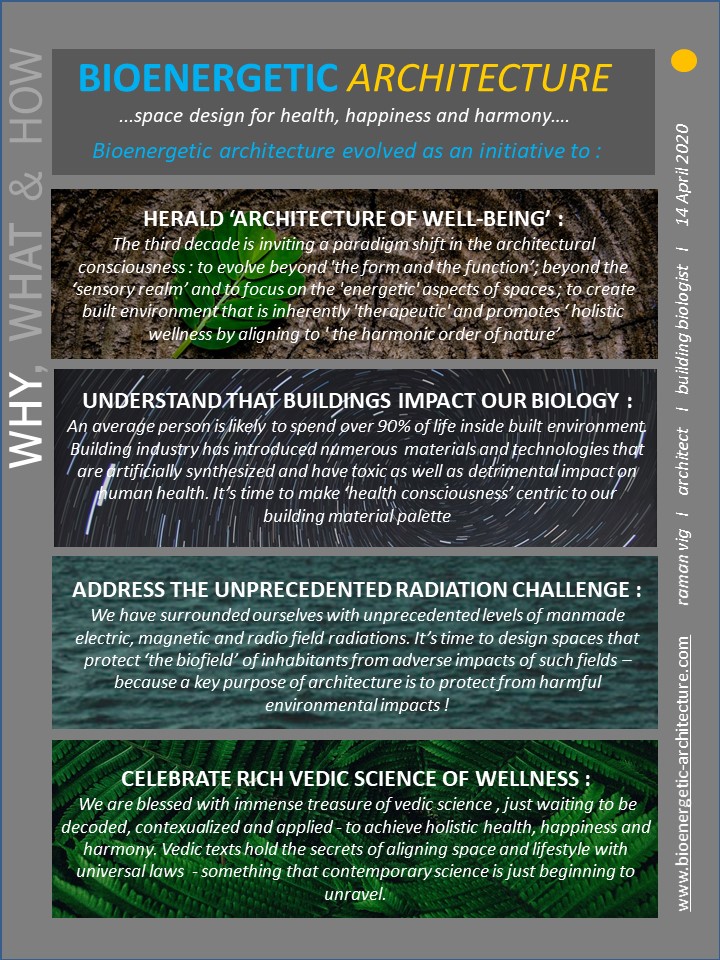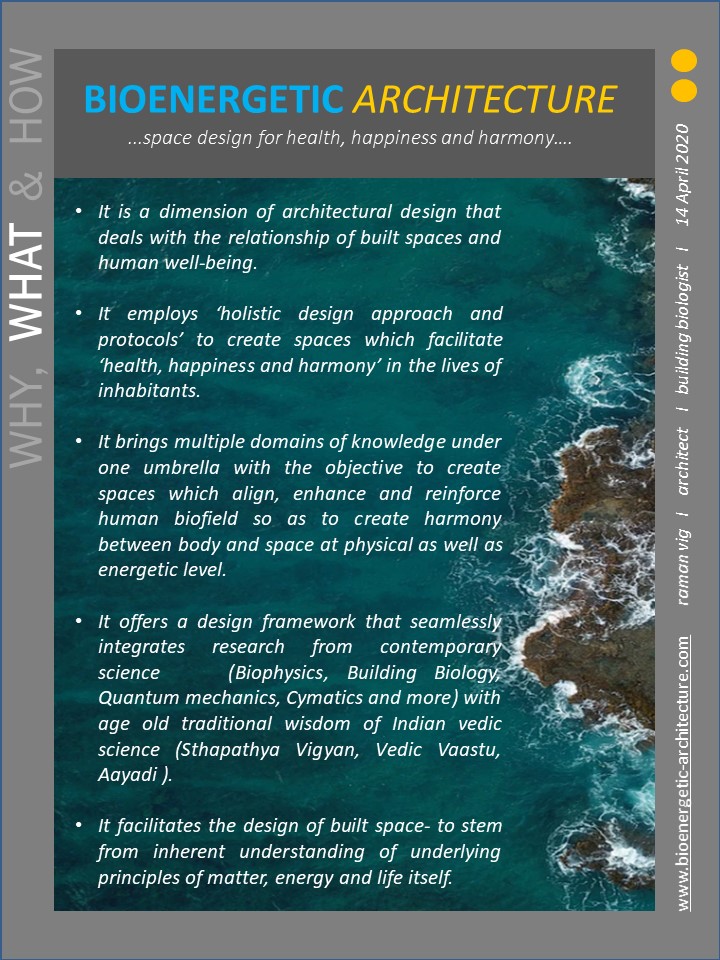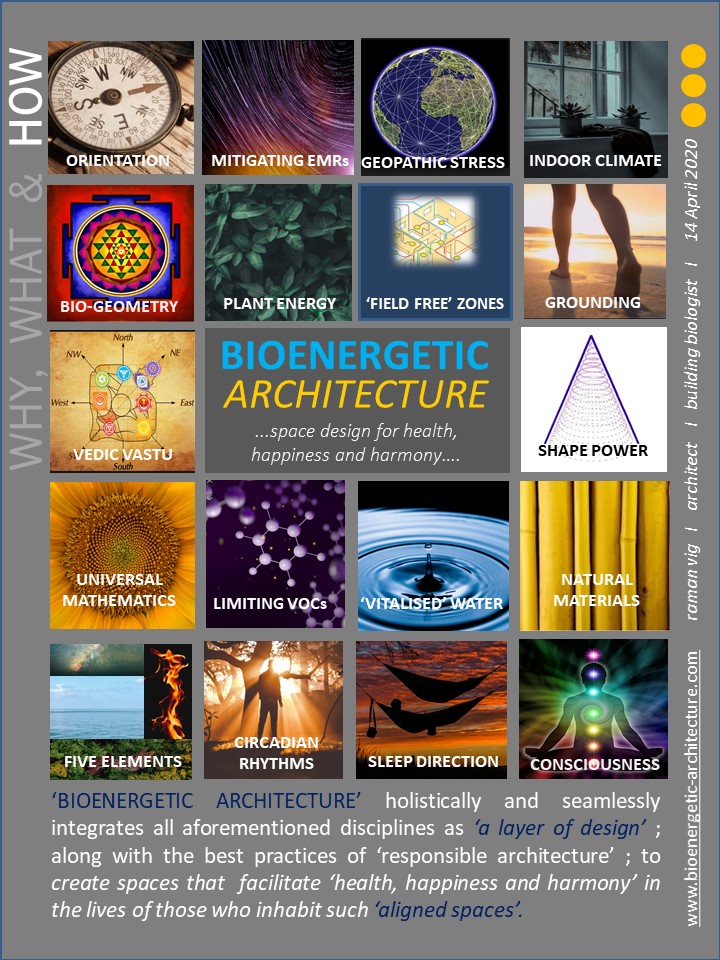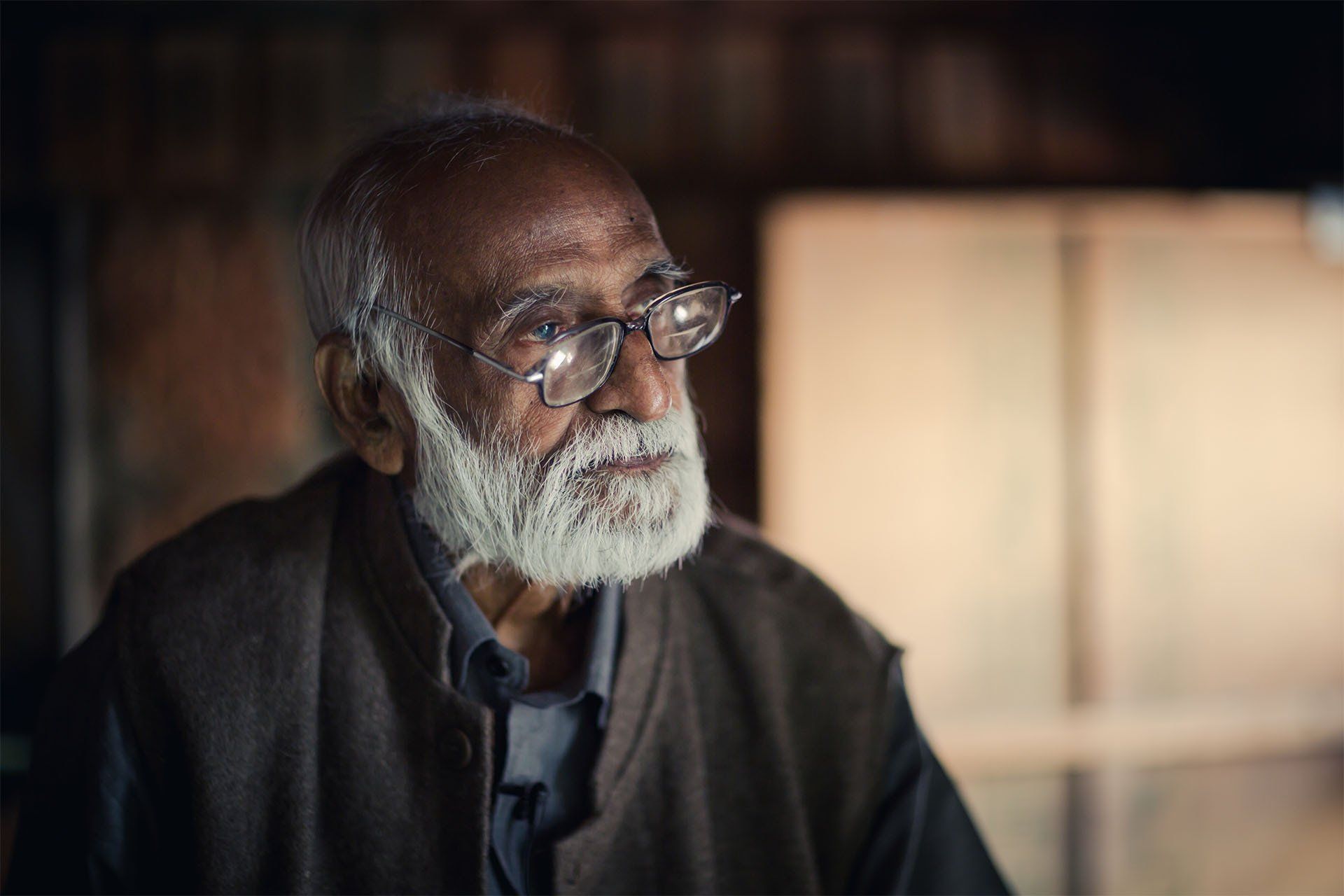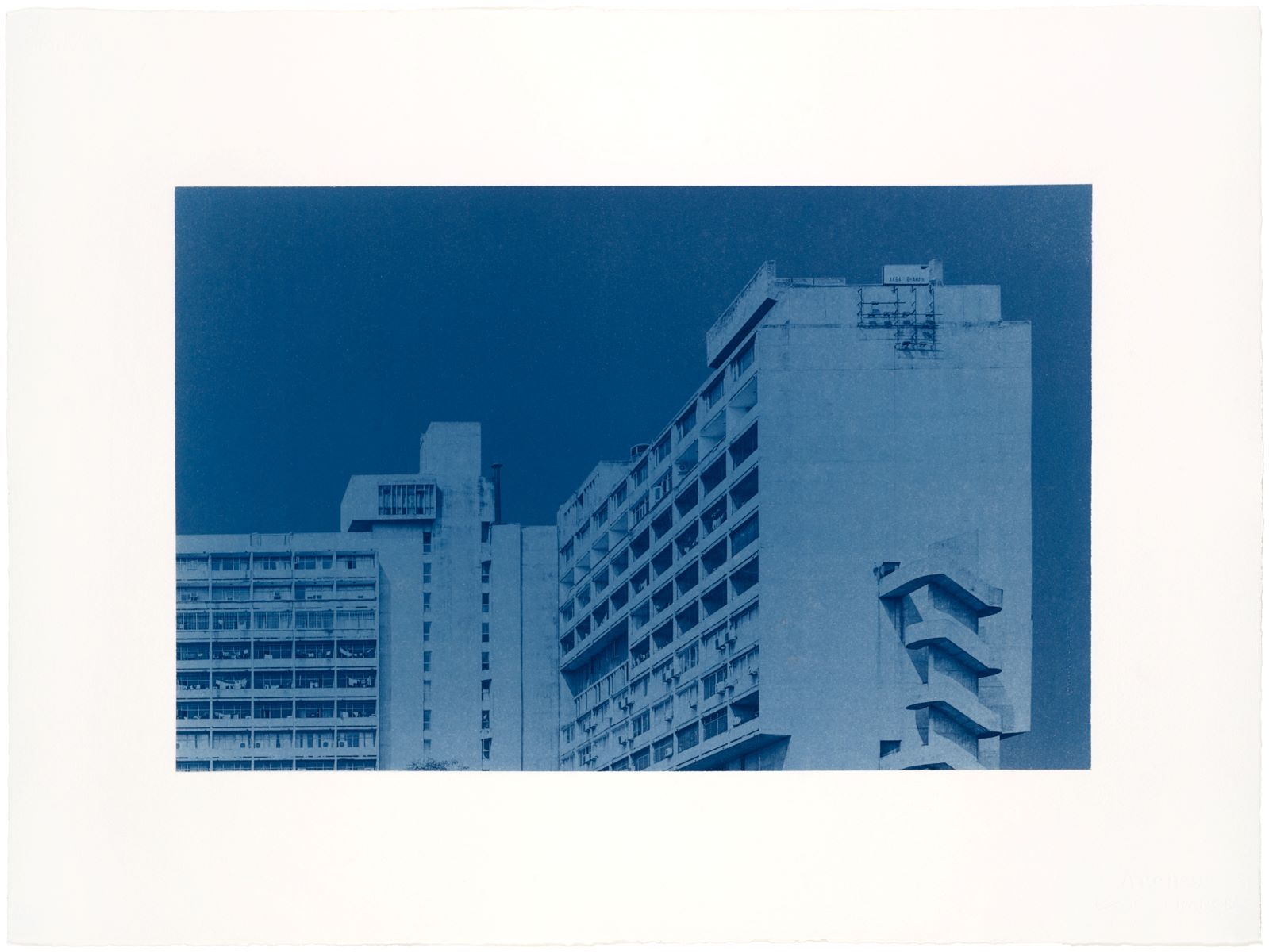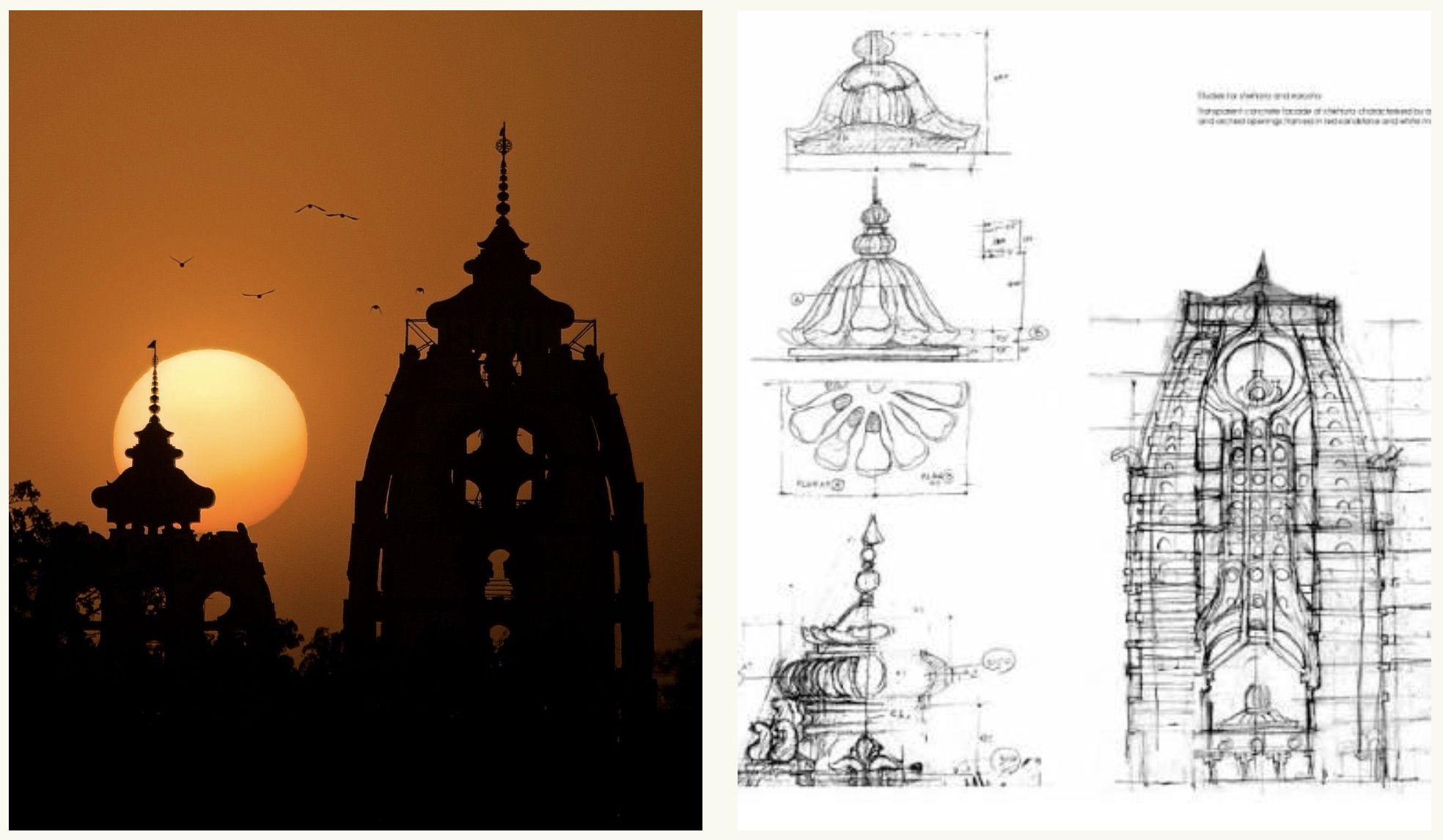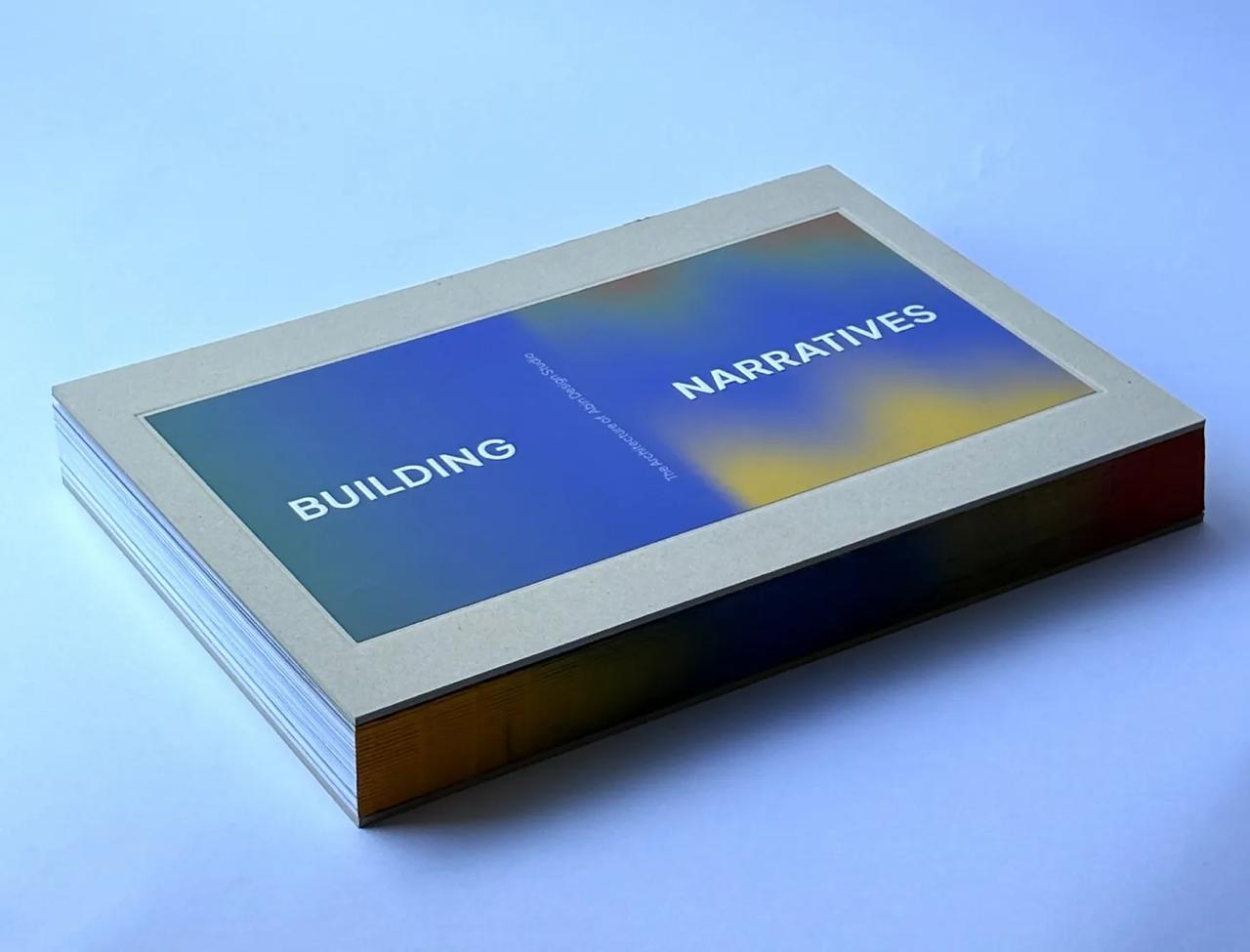‘Bio-energetic Architecture’ maybe best described as a new term for an ancient concept; something akin to ‘old wine in a new bottle’……enchanting, effective, potent and contextualized for present day scenario!
Bioenergetics is the science of energy transformation and exchange within living beings and their environment. Taking forth the same essence , Bio-energetic architecture integrates the principles of ‘energy and information fields’ as well as ‘the fundamental laws of life’ and the ‘mathematics of universe’ within the design process so as to create built environments that are ‘energetically aligned to have a benign effect on human bio-fields’ besides imbibing all the desirable qualities of ‘conscious and responsible’ architecture.
Design paradigms through the ages :
The Vitruvian triad of ‘Firmitas Utilitas Venustas’ ( Structural firmness, Utility and Beauty) has remained centric to the architectural design thought since 1 B.C. for nearly 19 centuries Mid of 20th century saw the addition of ‘Cost, Time and Quality’ to this triad in architectural design with ‘market forces of commerce and efficiency’ taking center stage in design discourses. In the new millennium, ‘Sustainability and Eco-consciousness’ have become centric to responsible design thoughts.
One now wonders, what significant evolutionary shift to expect in the coming decade(s) in the fundamental way space design is perceived and created – if at all any.
The game-changer of 21st century:
In 2012, at the CERN laboratory in Switzerland, the discovery of ‘Higgs Boson’ or the ‘God particle ‘ , brought science and the ‘ realm of spirituality’ on a common platform. We saw western science speaking the same thoughts ( although in different words) that Vedic science had been propagating.
Vedic knowledge talks of all-pervading ‘ consciousness’ or ‘the shiva tatva’ being the omnipresent ‘field’ from which everything is created, in which all is sustained and into which all eventually merge. And now Quantum physicists from CERN also explain :
‘The Higgs field is a field of energy that is thought to exist in every region of the universe. Particles that interact with the field are “given” mass and light that passes through it gain energy. So the Higgs effect transfers mass or energy to any particle that passes through it.’
The idea that the subtle gives rise to the manifest and controls it’s qualitative as well as quantitative aspects – is now being understood from both scientific as well as spiritual perspectives…..and this indeed is a game-changer of 21st century.
Everything is interconnected, intertwined with each other within a holistic whole. This is called biological integration or the harmonic order of nature. Within this harmonic order, all life forms have evolved, including human beings , who exist in a synergetic unity with their immediate and wider environment.
This new paradigm : that our physical world is a mere ‘reflection’ of the ‘energy world’ is fast becoming the basis of research and development in diverse fields.
The field of medicine has imbibed this reality through ‘Bio-resonance Therapy’ – a branch of energy medicine which works with the patient’s own electromagnetic fluctuation spectrum to regulate and detoxify itself and eventually cure any type of anomaly or ‘dis-ease’. In words of Albert Szent-Györgyi, MD Nobel Laureate in Medicine —
“In every culture and in every medical tradition before ours, healing was accomplished by moving energy.”
Therefore, the pertinent question for architectural community is : Will architectural consciousness extend beyond ‘the form and the function’ to focus on ‘energetic’ aspects of design? Can we design spaces that are inherently ‘therapeutic’ and ‘de-stressing’ by following ‘ the harmonic order of nature’? More fundamentally, can we bring the knowledge of the ‘ invisible energy fields’ and the ‘fundamental laws of the universe’ as an integral layer of design with the objective to create spaces that can create ‘health, happiness and harmony’ for the inhabitants ?
The answer is a ‘Big YES’ and this is what ‘Bio-energetic architecture’ is all about! This is the very intent with which our sages had developed ‘the science of vaastu’- eons ago. It’s time to ‘re-kindle’ the same intent and re-define ancient sciences for our changed context with integration of the ‘scientific tools’ of 21st century at hand.
‘Whys and Hows’ of Bio-energetic Architecture
There are multiple sciences that hold clues for the human well being and all of these contribute towards ‘Bio-energetic architecture’. Each science comes with it’s own ‘tools and trade-offs’ and the real skill lies in achieving ‘a seamless integration of these as a distinct integrated design discipline’ through various stages of an architectural project. Following are some key constituents that contribute to unique DNA of Bio-energetic architecture :
Bio geometry, Building Biology ( including electro-biology, Geo-biology, radio-biology ), Science of forms ( pyramidal energetic), Universal mathematics ( including Fibonacci series and proportions of pi and phi) ,Science of Geopathy, Science of Water ( as fluid information carrier), Fundamental precepts of Scientific Vaastu (radiation streams, direction science and five elements) , Quantum physics ( including dynamics of Consciousness), Bio-resonance ( including human aura and chakras) ,physics (of frequencies of colours , sounds, shapes) and material sciences ( involving aspects of building material and specifications)
Perched at the end of second decade of this century, we see stress has become a middle name for many ; instances of cancer , tumour , autism , alzheimer’s, infertility , mental and physical disorders have increased despite advances in mainstream medicine. People are increasingly turning to alcoholism and intoxication to be happy and relaxed . Inner peace and outer harmony have become elusive to most in our ‘technologically advanced and civilized’ society.
It seems only logical to look at how architecture can aid in restoring health and happiness on the planet. Bio-energetic architecture is a step in this direction – and prepares the ground for ‘Space- therapy’ : A new role and a unique dimension that the art and science of architecture can evolve into.



